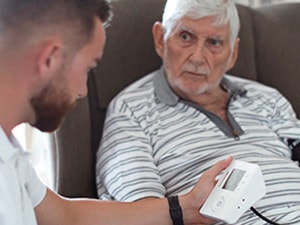Reducing the Risk for Heart Failure Exacerbations & Rehospitalizations
Reduce hospital readmissions for patients with heart failure by strengthening your clinical approach to home care. Learn how to identify early signs of exacerbation, improve medication management, and empower patients through education and support.
September 20, 2022
5 min. read

Heart failure is a highly prevalent diagnosis among home care patients and is associated with a high risk for hospital readmission secondary to disease exacerbation. Among Medicare patients with heart failure, an estimated one in four is readmitted to the hospital within 30 days of initial discharge. The occurrence of heart failure is so great that it is responsible for more hospitalizations each year than all forms of cancer combined, and one in eight deaths includes heart failure as a contributing cause.1
Today, most home care clinicians recognize that preventing hospitalizations is not only a home care priority but a publicly reported outcome. Acute care hospitalization is an important outcome that is now factored into value-based purchasing (VBP). In VBP, home care agencies potentially face financial penalties or gains based upon outcomes. It is also important, however, to recognize and appreciate the impact of the patient and family on repeated hospitalizations. Our overarching goal as clinicians must be to keep our patients safe and stable at home.
The Role of Home Health Clinicians in Preventing Rehospitalizations
Many heart failure hospital readmissions are preventable. Knowledgeable home care clinicians play a critical role in preventing such rehospitalizations.
Home care clinicians must possess a high level of expertise in heart failure care, including:
An understanding of both systolic and diastolic heart failure pathophysiology
Medication management
Exacerbation prevention and management
Clinicians must also recognize and understand patient barriers to disease management and work effectively with patients in developing a plan of care that works for both the patient and the family.
In a study that included interviews with 31 patients, researchers found that patients often struggled with adhering to care recommendations, were uncertain about the recommendations made to them, found instructions less than clear, and often felt hopeless and frustrated, which sometimes even led to worsening adherence.2 It is not uncommon for patients to attribute symptoms to unrelated conditions or to hope that the symptoms will go away.
Identifying Signs and Symptoms of Heart Failure Exacerbation
An essential aspect of heart failure care is assessment, monitoring, and promptly identifying signs and symptoms of exacerbation. With every home care encounter, including home visits, telephone/video calls, or evaluation of telemonitoring data, findings must be compared and carefully evaluated against previous assessments.
Medication management is critical to patient outcomes and reducing rehospitalization risk. A solid understanding of medications used to manage heart failure, as well as their possible side effects and adverse reactions, is essential for the clinician. These include angiotensin-converting enzyme (ACE) inhibitors, angiotensin receptor blockers (ARB), beta-blockers, and diuretics.
Symptoms such as increased weight without additional symptoms, increased lower extremity edema, abdominal swelling, increased shortness of breath/cough, orthopnea, or dizziness can be managed at home with medication adjustments. Patients may require a temporary increase in diuretics for fluid retention or, perhaps, a decrease in diuretics, ACE inhibitors, or beta-blockers to manage symptomatic hypotension.
Moreso than any hospital clinician or provider, the home care clinician is in the best position to evaluate how the patient and their family manage medications. This includes the opportunity to assess organizational systems for taking and refilling medicines, understanding their level of medication knowledge, and assessing their level of medication adherence.
The Psycho-Social Impact of Heart Failure
A complete assessment goes beyond the physical exam and symptom identification, as the effect of heart failure exceeds the physical condition. We must also assess the mental condition of the patient, including the psycho-social impact of the disease and the requirements for proper management.
We must consider the stress and burden of recommended self-care practices such as weight and symptom monitoring, medication tracking and administration, management of other clinical conditions, financial issues, and anxiety or fear about their prognosis.
Depression is not uncommon among older adults with chronic illnesses such as heart failure.3 It is not uncommon for clinicians to characterize patients as noncompliant. While the term adherence is recommended over compliance as it is reflective of collaboration between healthcare providers and patients and families, the important point is to never label patients, but rather to evaluate potential barriers to adherence.
Suggestions for Improved Home Care for Heart Failure
Consider lack of knowledge and previous guidance patients may or may not have received. In the study cited earlier, some patients found that instructions were less than clear.2 In another study, nearly 50 percent of patients with heart failure were unaware it was a lifelong disease and did not understand the importance and rationale of weight monitoring and dietary restrictions.4
The use of open-ended questions and teaching strategies such as the teach-back method and the use of plain language over more complex healthcare jargon are essential tools when assessing the level of knowledge of a patient and their family.
Many patients lack confidence in managing their care. Developing goals collaboratively with the patient and their family is important. Home care clinicians may document expected outcomes in the electronic health record, but ensuring that the patient and family are aware of what we expect of them within the home care setting is quite different.
Many, if not most, heart failure exacerbations leading to hospitalization are preventable when patient self-management is carefully assessed and addressed.1 A highly confident and educated home care workforce is essential to keeping patients at home.
For more information about the material presented in this article and other aspects of the management of heart failure, I offer these four courses on Medbridge that cover the anatomy and pathophysiology of heart failure, monitoring for signs and symptoms of heart failure, medication management, and prevention of heart failure exacerbation.
Below, watch Lisa Gorski discuss self care practices to prevent heart failure exacerbation in this brief clip from her Medbridge course, "Preventing and Managing Heart Failure Exacerbation."






